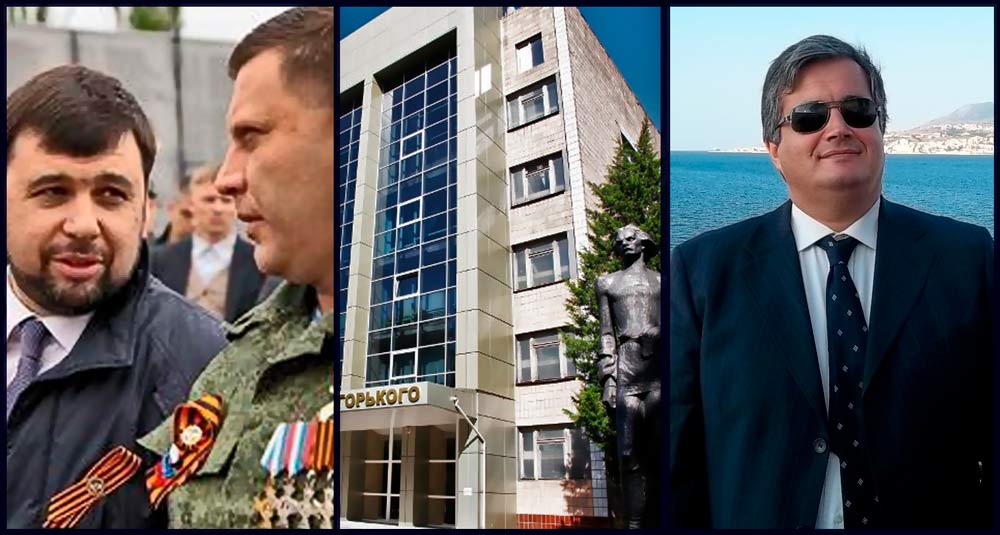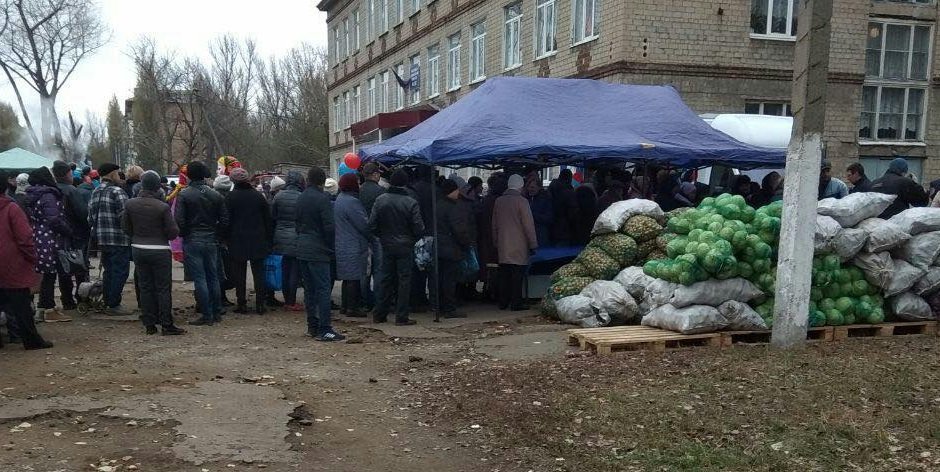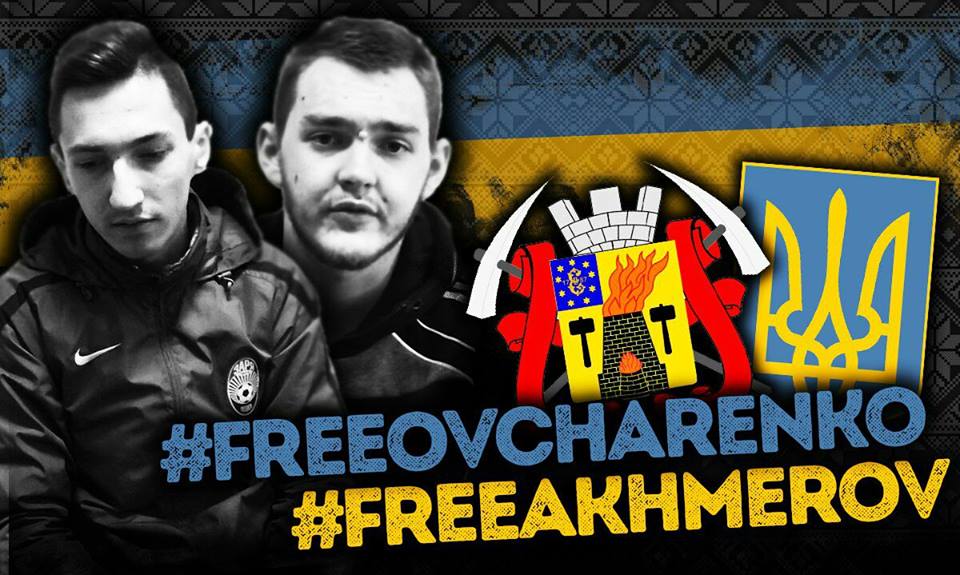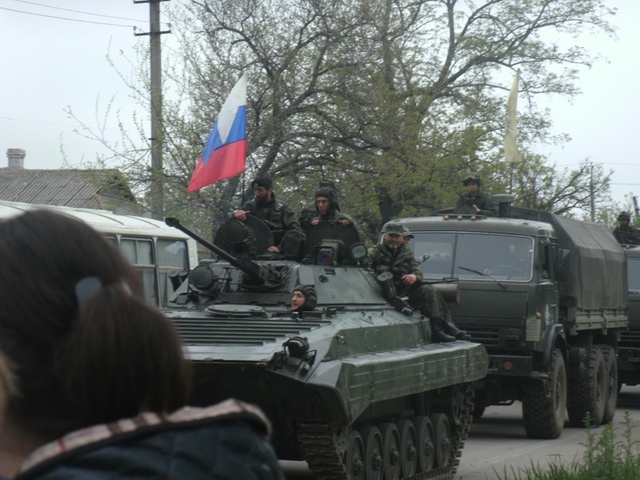Zakharchenko attacks political rivals
The Donetsk “People’s Republic” was hit by fresh political infighting last week after separatist leader Alexander Zakharchenko demanded that two members of “parliament” should be investigated for unethical behavior and ordered parliamentary “speaker” Denis Pushilin to oversee this.

Zakharchenko said during a TV question and answer program on June 28, that Yelena Melnik and Valery Skorokhodov should lose their parliamentary seats if accusations against them are upheld. In footage shown during the program and backed by a loyal TV reporter, Melnik was alleged to have been rude to hospital staff. Skorokhodov was accused of illegally acquiring a "nationalized" farm.
Pushilin duly promised the next day that the parliamentary ethics committee would look into both cases, but the committee had already sided with Skorokhodov. In a highly unusual move for the otherwise servile “people’s council”, the committee on June 28 demanded an apology from Oplot TV for the report in which the MP is lambasted for resisting the farm’s nationalization. The committee added that it recommended Skorokhodov to file a complaint to prosecutors and sue the TV station for libel.
These findings are especially daring because Oplot TV, named after Zakharchenko’s pro-Russian movement, serves as a mouthpiece for the “DNR” leader and his powerful ally and Income “Minister” Alexander Timofeyev.
The Oplot report, aired on June 27, accuses Skorokhodov of doing business “with the enemy,” having bought a farm, that “should be” state property, from its Ukrainian owner. The footage shows a tense standoff between armed men from Timofeyev’s “ministry” and Skorokhodov, who is seen arriving at the farm south of Donetsk in a shiny Range Rover.
The “MP” later denied that he had bought the farm and said that he had just been helping a local farmer, who had called him for help. He also accused Timofeyev’s people of acting with impunity and alleged that the Oplot programme was fabricated.
Skorokhodov is a DNR deputy representing the unofficial “DNR” ruling party (officially a movement) headed by Zakharchenko. However, he is reportedly a close ally of Pushilin, who was ousted as “Donetsk Republic's” executive officer in October, just as Zakharchenko announced that he would seek re-election in November 2018 (see Newsletter 28). On July 3 the party presidium unanimously expressed its disapproval of Skorokhodov’s behavior.
Melnik is a member of the “Svobodny Donbas” faction, which has in the past weeks repeatedly challenged Zakharchenko’s and Timofeyev’s authority.
Notably, the dispute between Zakharchenko and the MPs was reported on the official DAN news site, but there was no mention of it on the site of Melnik’s “Svobodny Donbas” party, nor on dnr-live.ru, a news site linked to the party. The official “DNR” website also did not report the story.
Zakharchenko’s attacks against both MPs can be seen as a warning against potential opponents in the upcoming “DNR” election. The separatist leader said during the June 28 TV programme that “there are more and more” pretenders for his job.
Zakharchenko also claimed that campaigning had not begun, which Ukrainian media interpreted as a signal that Moscow, believed to control much of the separatist politics, has not decided who it will back if such elections are to be held.
However, Zakharchenko made some typical pre-election promises, like raising wages for miners (up to 45,000 Russian roubles) and reducing petrol prices. On June 2, his office said that the nighttime curfew would be moved forward from 11 pm to 1 am after “numerous requests” were made during the TV show.
Read also:
- Who is who in the Kremlin proxy “Donetsk People’s Republic”
- Despite rumors of resignation, Putin’s gray cardinal Surkov keeps job
- After the coup in occupied Luhansk: a real junta and more Russian FSB control
- Mysterious deaths of chieftains in Russian-backed “republics” since 2015 in a nutshell – #Infographic
- Founder of Russian-backed "republic" dies in Donetsk at 54
- “Donetsk People’s Republic” ex-PM inadvertently admits he carried out Kremlin plans
- Putin's top aide managed Donbas militants -- Strelkov
Donetsk university to hand out Russian diplomas
Zakharchenko also reiterated during the June 28 TV program, that despite the Minsk agreement, his aim remains to build an independent state. In another step towards the separatists’ goal of “integration with Russia,” the “DNR” said that its main medical university will soon be offering Russian diplomas to its students. The Donetsk National Medical University will be evaluated by Russia’s education oversight agency Rosobrnadzor between July 9 and 24, the Education “Ministry” said in a statement on July 2.
If the evaluation is positive, the university will become the first in the separatist-controlled areas to offer Russian diplomas. Like most universities, the Donetsk Medical University in 2014 split into two parts after pro-Ukrainian staff and students set up a new campus in government-controlled Lyman and Kramatorsk.
Universities in both “People’s Republics” started handing out diplomas from Russian universities already last year. However, to receive them, students had to enroll in Russian universities and engage in distance learning. Ukraine does not recognize diplomas issued by separatist authorities. The government in Kyiv has recently stepped up efforts offering students in separatist-controlled areas and in Crimea to get Ukrainian diplomas by enrolling in distant learning programmes known as “externat” in Russian and Ukrainian.
Read also:
- How education is being turned over in Donetsk
- Displaced universities: 18 Ukrainian colleges are exiled in their own
- The Kremlin's five steps towards recognizing “DNR/LNR”
- School children from occupied Donbas want to enter universities in free Ukraine
- A student from Ukraine's Donbas who lived through war
“LNR” office opens in Sicily
Back in 1919, Soviet Russia established a Russian Soviet Government Bureau in the United States, it was an unofficial “diplomatic organization” functioned as a trade and propaganda agency of the Soviet government. The bureau was headed by German citizen Ludwig Martens who was born in the Donbas city of Bakhmut. The “mission” was terminated early in 1921 as its head was deported from the USA. Read more.
Both "people's republics" haven't been recognized as states even by Russia but they need some kind of positive news for their supporters about soon worldwide recognition of pseudo-states. That's why from time to time, Russian curators of LDNR from time to time present fake diplomatic missions of "LNR" and "DNR" in European countries, using the early Soviet diplomatic tactics, used in 1919 by the Soviet in their attempt to get the recognition of Soviet Russia.
And now the Luhansk pseudo-republic has opened their second foreign representative office – in Messina, Sicily. Russian sources labeled it "the first LNR embassy in the EU" but they forgot that there was an attempt to open a fake "LNR embassy" in Vienna, Austria in 2016.
Meanwhile, the "Luhansk People’s Republic" announced the opening of its first representation abroad. The office in Messina on the Italian Island of Sicily is another step towards the republic’s international recognition, Foreign “Minister” Vladislav Deinego said. However, Deinego did not attend the opening but spoke to the center’s Italian activists during a video call from Luhansk.
Both “people’s republics” are recognized by no other country except South Ossetia, itself a little-recognized breakaway territory in Georgia.
However, the “DNR” has already opened representations in five European countries, including Greece, Finland, and France. In December 2016 it opened an office in the north Italian city of Turin (see Newsletter 12). A center in the Czech city of Olomouc was closed by Czech authorities in April.
The centers are typically run by local pro-Russian activists and have no official links to the host country’s governments. On its Facebook page, the “LNR” office in Messina claims to be a cultural center. Its head, Daniele Macris, is apparently a local scholar for Greeks and other ethnic minorities in southern Italy.
The late opening of the first “LNR” foreign representation can be explained by the fact that the Luhansk separatists appointed their first foreign “minister” only in September 2017. And as “Minister”, Deinego has continued to focus on his job as the “LNR” chief Minsk negotiator. To this date, his “ministry” has no website but only a Facebook page with a mere 100 likes.
Read also:
- Kremlin-run “DNR” opens fake diplomatic mission in France. Are Nordic countries next?
- Kremlin-backed “DNR” to open fake diplomatic mission in Greece
- Kremlin-run "DNR" opens fake diplomatic mission in France
- Italian deputies demand explanation for "DNR office"
- Soviet tactics: “DNR” and “LNR” “embassies” pop up in the EU
- Italian deputies demand explanation for “DNR office”
- Documents show French far-right’s involvement in war in Donbas
- Interactive map shows origins of Russian mercenaries fighting in Donbas
- How Alexander Dugin’s Neo-Eurasianists geared up for the Russian-Ukrainian war in 2005-2013
- German Die Linke delegation visits right-wing terrorists in Eastern Ukraine
- Russian media lies: ‘free elections’ in Donbas acknowledged by the EU Parliament





